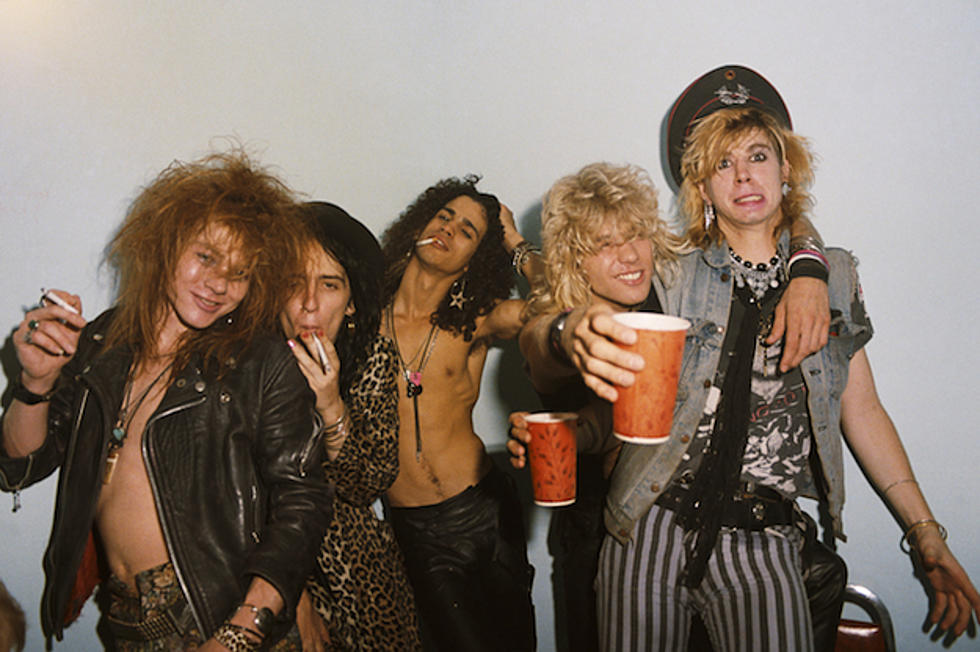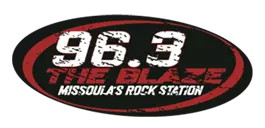
38 Years Ago: Guns N’ Roses Sign to Geffen Records
On this day in Guns N' Roses history, the band signed their first major label deal.
When Guns N’ Roses signed to Geffen Records on March 26, 1986, for an estimated $250,000, no one could imagine that less than three years later the band would be one of the biggest names in rock 'n' roll. Many speculated that Geffen would never even recoup its initial advance payment of approximately $37,000 to the irresponsible, drug-addled degenerates.
Guitarist Slash immediately took his cut and spent “almost all of it on heroin,” he wrote in his titular memoir, and the other members – vocalist Axl Rose, guitarist Izzy Stradlin, bassist Duff McKagan and drummer Stephen Adler – spent their cash almost as wisely. Guns N’ Roses didn’t have their own place until their A&R man Tom Zutaut procured them a small apartment on dilapidated Fountain Avenue.
Finding a good manager proved even more difficult. Randy Phillips (who now runs AEG Live) and Arnold Stiefel (best known for managing Rod Stewart) gave managing GN'R a shot before fleeing like a pedestrian from a horde of zombies.
“Every management company that I knew of turned them down,” Zutaut says. “They felt they were unmanageable because they believed the myth that they were all strung out on heroin and that they were unproductive and would never get in the studio. And Axl was late for things. There was a period of time where they had no manager. I was essentially managing them.”
Guns N' Roses, "Welcome to the Jungle" (Demo Version)
Desperate and in need of someone the band would respect and occasionally listen to, Zutaut reached out to Alan Niven, an Englishman who still believed in the transformative power of music. Niven had managed Great White, worked at Enigma and signed Motley Crue to Greenworld for Too Fast For Love. “Zutie and I were good friends,” Niven says. “He and I got Motley Crue signed to Elektra and I persuaded him to take Dokken to Elektra. So, Zutie came to me and said, ‘Would you please talk to Guns N’ Roses?’ I looked at him and said, “You’re fucking joking! Good luck with that crew.”
Although their first discussion was unproductive, Zutaut was eventually able to appeal to Niven’s sympathy and convince him to check out the band. “He basically laid it entirely on the line,” Niven recalls. “He said, ‘Niv, this could be the end of my career. This is shaping up to be a total disaster. Can you please help?’ Since we were friends, I said, ‘Okay, I’ll go and talk to them.’ I went to see a couple of shows and then I went to the Troubadour and started to talk with them and realized there was some intelligence there. Then I went to Pasha Studios, where they were doing demos, and at that point I started to get very intrigued.”
Niven realized that not only were Guns N’ Roses authentically “rock and roll” in the tradition of his favorite bands – true to themselves before anyone else -- they had a great chemistry and an undeniable musical groove when they locked in.
“The personalities in that band were wonderful,” Niven enthuses. “You’ve got Duff, who was, at the time, a punker who was gripping with all his might onto the idea of maintaining musical integrity. And you had Izzy, who had this style. The very first time I saw them, the people who intrigued me most on the stage were Duff and Izzy, not Slash and Axl. And I didn’t quite get the hair drummer in the back, either.
“Duff and Izzy had this really centered and incontrovertibly cool body language and they were holding themselves onstage and playing together in such a way that I went, ‘Oh, hello! This is not half bad.’ It really wasn’t until I spent more time with their demo tapes and mixing them that I began to realize that Slash was somebody who might be a really, really good player, and of course, Axl’s voice was extraordinary. My perception was if I can hold this together, if I can get a balanced pragmatism with the spontaneity, then maybe what I’ve got here is a really, really good underground rock and roll band. So I stepped on board.”
Realizing America had grown lukewarm about bombastic rock, and that England still embraced showmanship and antics, Zutaut and Niven convinced executives at Geffen to put the band in the studio and get them to record a batch of rough-and-tumble tracks for an EP they would fund but release through the important distribution channels under the label Uzi Suicide. For the project, Guns N’ Roses recorded two originals -- “Reckless Life” and “Move to the City” -- and a couple of covers including Rose Tattoo’s “Nice Boys” and Aerosmith’s “Mama Kin” live in the studio. Then the EP Live ?!*@ Like a Suicide was pressed and shipped off to a batch of Yankophile journalists in England (it would later be released internationally as the multi-platinum Lies, with the additional tracks “Patience,” “I Used to Love Her,” “You’re Crazy” and the controversial “One in a Million").
Guns N' Roses, "Reckless Life" (1986 Sound City Session)
“The English really value authenticity and there was nothing contrived about Guns N’ Roses,” Zutaut says. “They lived the life, they were what they were and everything they did was out of a passion and a musical desire that was different than that of a lot of other bands. They were the real deal. They lived, ate and breathed exactly what they were, and the Brits couldn’t get enough. We sent them over there to play and they exploded from a visit essentially constructed from a homemade, contrived live record and some great press clips.”
Riding the wave of U.K. hyperbole, Guns N’ Roses played a series of shows in the U.S. between recording sessions for Appetite for Destruction, and before long, excitement and curiosity about the band spread, fueled by their reputation for being unstable and chaotic.
READ MORE: Guns N' Roses Members Play 'Wikipedia: Fact or Fiction?'
“Part of the appeal of the band was the fact that it was a train wreck,” Niven says. “The sense of spontaneity that they had contrasted magnificently with the contrivance of so many other bands. When they held it together onstage, they were fantastic. They were a destructive band that somehow sounded fucking awesome.”
Though it became clear that Guns N’ Roses was a viable force, starting to unveil songs like “Welcome to the Jungle” and “Paradise City” for their label, there was still a general reluctance to accept that they were on their way to becoming superstars.
“I felt like there was no way in hell that they were going to be a huge success in that time and place,” Niven says. “Radio was still in, fundamentally, Bad Company territory and it took a little while to be able to break that mold. I figured if they can manage to stay together then maybe we can get up to the 500,000 sales mark at some point. Nobody, but nobody, foresaw them being as successful as they were. That was part of the magic of their whole story. There was a very spontaneous and unexpected response from such a large audience. And for a little while, at least, they were the biggest band in the world.”
Loudwire contributor Jon Wiederhorn is the author of Raising Hell: Backstage Tales From the Lives of Metal Legends, co-author of Louder Than Hell: The Definitive Oral History of Metal, as well as the co-author of Scott Ian’s autobiography, I’m the Man: The Story of That Guy From Anthrax, and Al Jourgensen’s autobiography, Ministry: The Lost Gospels According to Al Jourgensen and the Agnostic Front book My Riot! Grit, Guts and Glory.


